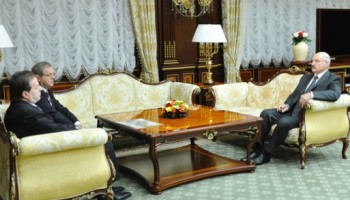While their cities endure relentless bombardment, some Ukrainians are spending time in shelters placing bets in a digital casino that, according to Kyiv, is linked to the Russian government behind the attacks—unknowingly funneling money to the very regime waging war on them.
That’s the rationale behind Ukraine’s decision last month to impose sanctions on Cyprus-based Russian businessman Dmitriy Punin, who—despite what official documents state—is identified by Ukrainian investigators as the real owner of the online casino Pin-Up.
“Join the winners,” the Pin-Up website beckons, featuring a red-haired woman holding playing cards. “With a reputable Curaçao license, the casino commits to delivering an enjoyable, transparent, and secure gambling environment, making it a perfect choice for players from different parts of the world.”
For players in Kyiv and other cities under attack, the environment is far from enjoyable. But it gets worse.
Ukrainian investigators not only believe those behind the online casino are “filling the aggressor’s budget,” but also warn that the company may have access to the location data of Ukrainian armed forces personnel who use the platform.
Kyiv’s sanctions on Punin, along with nine companies and two Russian business associates, follow an investigation launched in April 2024 into Ukrainian entities linked to Pin-Up. Authorities suspect them of “aiding an aggressor state” and operating illegally in Ukraine.
In January, Ukrainian authorities arrested Igor Zotko, the owner of Ukr Game Technology LLC, the company running Pin-Up’s Ukrainian branch. Investigators claimed Zotko had “been in Cyprus for a long time, where he spent time with Russian citizens—the real owners of the online casino.”
The company told reporters in an email that Zotko purchased his stake in March 2023 for approximately 1.5 million euros, and that the allegation made by Ukraine “that Igor Zotko nominally owns his stake of the company and the company is owned by Russians is completely untrue.”
Authorities also stated that between December 2023 and April 2024—as Russian forces pounded Ukrainian cities and villages—Ukr Game Technology paid over 6.2 million euros in royalties to Cyprus-based Guruflow Team Ltd., which owns the Pin-Up brand. The company was owned by Punin until his shares were transferred to his wife, Maryna Ilina, in February 2022, just days before the war.
In April, Guruflow sold its Russian subsidiary PinUp.Ru LLC to Aleksander Udodov, the former brother-in-law of Russian Prime Minister Mikhail Mishustin, for €13 million.
Guruflow had owned the subsidiary for only five months and sold it at a €1.5 million loss. Udodov sold the company again just 13 days later. It has since been renamed Fonkor and is now owned by a Russian entity whose true ownership remains unclear.
Punin did not comment on the transfers or the accusations from Kyiv, but his wife did.
“In spite of the financial losses that I have suffered I am very proud, as a Ukrainian citizen, of this decision of mine,” Ilina told CIReN in an email, referring to the sale of the Russian subsidiary to Udodov.
She also denied having any connections to the Russian government, or contributing to Russia’s budget.
“Guruflow Team Ltd has never made any payments to Pin-Up Ru LLC during the period of ownership of corporate rights in the said entity, and Pin-Up Ru LLC did not pay any taxes in the Russian Federation during the time that Guruflow Team Ltd held a share in its charter capital,” she said.
That’s the part Ukrainian investigators are not buying. The zigzagging ownership trail and the deliberate financial loss appear to them as attempts to obscure the real owner—Punin, a man they believe is connected to Russian governing circles.
Ukrainian investigators wrote in a court document that “the information presented about the rapid changes in the founders of the above-mentioned company and its name, as well as the available data, indicate that the changes in ownership were merely formal, that the ultimate beneficiaries remained unchanged, and that the company continued to conceal its operations in the Russian Federation and its cooperation with affiliated parties.”
Zhanna Ulyanova, Andreas Cosma, Elena Loginova and Misha Gagarin contributed reporting.






